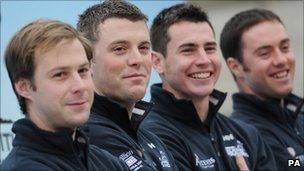Prince Harry to join Army veterans in North Pole trek
- Published
Guide: "I think these guys are as ready as any other expedition..."
Prince Harry is to join four wounded British Army veterans when they attempt to trek 200 miles (320km) to the North Pole in April. The men were all injured on the front line in Afghanistan.
Two hundred miles, four weeks, four wounded soldiers and one North Pole.
It is a catchy set of statistics adopted by the charity Walking With The Wounded, which aims to get the badly injured servicemen across the polar ice cap, unsupported.
Last year, I watched the team training in the Arctic archipelago of Svalbard, following them on a snowmobile as they got their first taste of the snow and ice.

Polar bears and compacted ridges are among the dangers the team faces
The final expedition names have now been announced, together with news that Prince Harry - third in line to the throne and patron of the charity - intends to go with them for part of the way, subject to his military and royal commitments.
In practice, that means a severely squeezed timetable for the prince who still has weeks of helicopter training to complete with the Army and then a rather important wedding to attend, his brother Prince William's, on 29 April.
"I am so proud to be patron of Walking with The Wounded," the prince said.
"This extraordinary expedition will raise awareness of the debt this country owes to those it sends off to fight - only for them to return wounded and scarred, physically and emotionally.
"The debt extends beyond immediate medical care and short-term rehabilitation. These men and women have given so much. We must recognise their sacrifice, be thankful, and, so far as we can ever, repay them for it."
Sub-zero blizzards
On Wednesday morning in a grey, rain-soaked Trafalgar Square, the expedition revealed their final four team members, whittled down from more than 100 original applicants, alongside some of the equipment they will be using.
Two of the team are amputees. Cavalry officer Guy Disney, from Oxford, had his lower leg blown off by a rocket-propelled grenade in Afghanistan in 2009.
And paratrooper Jaco Van Gass, originally from South Africa, had his left arm amputated at the elbow after a similar attack on operations.

The four wounded soldiers have been training together for several months
Martin Hewitt, also with the Paras, has a paralysed right arm after being shot by Afghan insurgents, and Steve Young from the Welsh Guards fractured his back when his vehicle went over a buried mine in Afghanistan.
The wounded servicemen will have no resupply of provisions throughout their month-long trek, so will have to drag everything they need behind them in heavy arctic sledges called polks.
As well as battling against high winds, blizzards and plunging sub-zero temperatures, they will also have to cope with compacted ridges of ice, some near vertical.
They will also have to navigate a dreaded phenomenon called "leads", stretches of icy sea water that can open up gaps between the ice and which can only be traversed by floating across.
As the ice is constantly shifting, they face the possible nightmare scenario of skiing several miles northwards to the pole, only to drift backwards and end up even further away.
In the early days of the trek, the team may also have to contend with carnivorous polar bears near the coast, although attacks are rare and precautions will be taken.
Each man will pull sleds weighing more than 100kg in temperatures varying between minus 15C to minus 50C
Accompanying the team will be the charity's two founders, Ed Parker and Simon Daglish, and one of the world's most experienced polar guides, Inge Solheim from Norway.
When I last saw him in the Arctic, last May, he was bluntly pessimistic.
There was no way, he told me, that the team at the time was ready to take on the North Pole.
They simply did not have the strength, stamina, nor skills - such as knowing how to put up a tent in a howling blizzard when your whole body is crying out for food and rest - he added.
But now, eight months on, Inge had a smile on his face.
"They have been training individually and together for many months and they're getting there," he told me.
"I think these guys are as ready as any other expedition has ever been ready for the North Pole".
Unlike those four team members, Prince Harry is not, of course, disabled. But if all goes to plan and his commitments do indeed allow him to join the expedition for part of the way, he too is likely to find it an extreme challenge he will never forget.
- Published12 January 2011
- Published12 January 2011